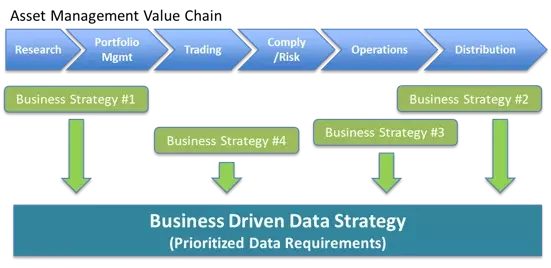In continuation of the Digital & Data-Driven Asset Manager Insight Series and in response to inquiries from our clients on “how do we become data-driven?” we address the critical success factors at both the executive and the execution level.
Executive Level:
- Strategic Imperative: Asset managers that succeed in building a data-driven organization have an active and engaged C-Suite leading the transformation. All employees must embrace the new data culture in order to survive and thrive in the digital business age.
- Business-Driven Data Strategy: The data platform investments must be tied to your business strategy with clear business value defined and ROI articulated.
Execution Level:
- Foundational: As we discussed in Data-Driven Part 3, focus on creating the building blocks of a holistic data platform: single sources of accurate, protected, and easily accessible data.
- Don’t boil the ocean: Agile, incremental business value delivery is critical to building momentum and demonstrating success. Tie data projects to strategic business objectives.
- Communicate: Data transformation projects impact most roles of the firm. You can never over-communicate and field questions; preferably in-person to include everyone on the journey.
- Celebrate: Delivering data solutions incrementally allows for milestones to be celebrated and socialized to reinforce the success of the new data-driven culture.
Business-Driven Data Strategy
The most successful data transformations are aligned with business strategy and are supported by executive leadership. To get support, you must meet with senior leaders to understand their vision, business strategy, critical projects, and data challenges leveraging the WIIFM (What’s In It For Me?) methodology. Business leaders are willing to make time to discuss their strategies with the hope of accelerating delivery and improving technology partnerships. Gathering business strategies and linking them to data requirements is the foundation of the Business-Driven Data Strategy.

With a clear understanding of the importance of the new data platform to their business, executive stakeholders are willing to help clear obstacles. Scheduling periodic value delivery meetings during implementation keeps leaders engaged and improves the overall data culture of the firm.
In the next Data-Driven Asset Management Insights series, we will discuss the empowering role of data governance.
For more information, contact:
